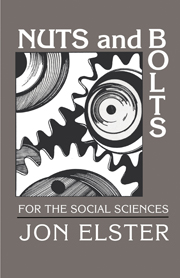XVI - Social Change
Published online by Cambridge University Press: 05 June 2012
Summary
AROUND 1630 we find Descartes arguing with a friend who believes that a cannon ball reaches its highest velocity some time after leaving the muzzle. The friend's belief is quite natural. When a person starts running, it takes a while before he reaches his maximum speed, after which he eventually runs out of strength. Also, it takes some time before the ball reaches the highest point in its trajectory. The idea of a gradual buildup and then gradual depletion of forces is compelling. It took the genius of Galileo and Descartes to see that movement is not a process but a state that will persist indefinitely unless perturbed by external forces. The ball reaches its maximum velocity at the moment of leaving the muzzle and would go on at the same speed in the absence of air resistance and gravity.
Organic metabolism presents another ambiguity. Looked at from close up, the destruction and creation of cells seems to be a process of incessant change, almost chaos. If we step back, however, we see that there is a pattern in the change. New cells of a given kind are being created at the same rate at which old cells are being destroyed, the net result being that the cellular structure as a whole is maintained unchanged.
- Type
- Chapter
- Information
- Nuts and Bolts for the Social Sciences , pp. 159 - 172Publisher: Cambridge University PressPrint publication year: 1989

